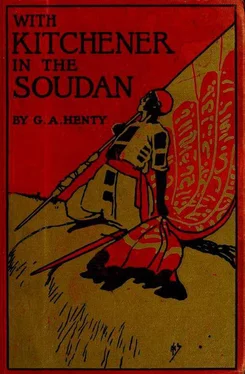Twice that day Gregory had received food from a female slave of the harem. Although he knew that he should miss Zaki greatly, he was very glad that he had been sent away, for he felt that, although for the time he had been reprieved, his position was very precarious, and that his servant's would have been still more so. A white prisoner was a personage of some consequence, but the death of a Jaalin was a matter that would disturb no one; thousands of them had been massacred, and one more or less could not matter at all. But however much the Dervishes might hate a white infidel, it would be a serious matter for even the most powerful Emir to harm a prisoner under the protection of the harem of the Khalifa's son.
Mahmud had been very popular among them, but his position had been gravely shaken by the events of the last six months. Having unlimited confidence in themselves, the Baggara had seen with increasing fury the unopposed advance of the Egyptians. They could not understand why they should not have been allowed, after the capture of Metemmeh, to march across the desert to Merawi and annihilate the infidels assembled there. It was true that these had repulsed the force defending Dongola, but this was a comparatively small body, and it was the gun-boats and not the Egyptian troops who had forced them to evacuate the town. The fall of Abu Hamed had added to their discontent, and they were eager to march with all speed to Berber to join the five thousand men comprising its garrison, and to drive the invaders back across the Nile. But they had been kept inactive by the orders of the Khalifa and by the want of stores. They had for months been suffering great privations, and while remaining in enforced inactivity they had known that their enemy's strength was daily increasing, and that what could have been accomplished with the greatest of ease in August had now become a very serious business. Mahmud himself had chafed at the situation in which he found himself placed by his father's refusal to support him or to allow him to take any action. This had soured his temper, and he had taken to drinking heavily— he had become more harsh with his men, more severe in the punishment inflicted for any trifling disobedience of orders. Although no thought that the rule of the Khalifa could be seriously threatened entered their minds, fanatical as they were, they could not but feel some uneasiness at the prospect.
A great army was gathering at Berber; Kassala was in the hands of the British, and the forces that had been beleaguering it had been defeated with heavy loss; Abyssinia had leagued itself against them; the insurrection of the Jaalin had been crushed, but there were signs of unrest in Kordofan and other parts. Of course all this would be put right. An army of sixty thousand men was at Omdurman, and this with Mah-mud's command would suffice to sweep away all their enemies. Their enthusiasm would never have wavered had they been called upon for action; but these months of weary waiting and of semi-starvation without the acquisition of any booty or plunder—for little indeed had been obtained at the capture of Metemmeh—sapped their energy, and the force that crossed the Nile for an advance upon Berber was far less formidable than it would have been had it been led forward against Merawi and Dongola directly after the capture of Metemmeh, —still, it needed only the prospect of a battle to restore its spirits.
A fortnight after Gregory's capture the Dervish army was set in motion. A few thousand men had already been sent forward along the banks of the river to check any advance that might be made from Fort Atbara. Had it not been for this Gregory might have attempted to escaoe. It would not have been very difficult for him to creep out at the back of his little tent unperceived by his guards, but the dangers to be encountered in making his way to the British fort would have been immense. It would have been necessary for him to keep by the river, for from this source alone could Avater be obtained.
The country had been stripped of its crops of all kinds by the Dervishes, the villages had been razed to the ground, and the last head of maize and other grain gleaned by the starving people who had taken refuge in the bush and jungle.
Therefore, although by keeping near the river he could quench his thirst at will, he would assuredly have to face starvation. Moreover, he would have no chance of searching for any ears of corn which might have escaped the eyes of the searchers, for he must travel only by night and lie up by day, to avoid capture by one or other of the bands that had gone on, in which case he would at once be killed, being beyond the influence of Mahmud and the protection of the harem.
On the other hand, he had nothing to complain of except the monotony and uncertainty of his position. Fatma kept him well supplied with food, and from the gossip of the slaves who brought this to him he learnt how matters were progressing. He was longing for the Dervish army to make a move, for he felt that when they neared the British position the greater would be the chances of escape, and none among the followers of Mahmud rejoiced more than he did when he knew that the long-expected advance was about to take place.
Once in motion, the spirits of the Dervishes revived. At last they were going to meet these insolent invaders, and none doubted that they would easily defeat them. The greater portion of the harem and attendants were left behind at Shendy, for but few camels were available. Fatma and another of Mahmud's wives rode on one; a tent was carried by another. Half a dozen slaves followed, and Gregory walked with these. He could not help admiring the attitude of the tribesmen—tall, powerful men, inured to hardship, and walking or riding with an air of fierce independence which showed their pride in themselves and their confidence in their prowess.
The party always started early in the morning, so as to get the tents erected at the halting-place before the main body of the Dervishes came up. On the march they kept some distance from the river, and being but a small group the gunboats did not waste their shot upon them; but each day there was a sharp exchange of fire between them and Mahmud's force.
Gregory supposed that Mahmud's plan was to cross the Atbara, which was fordable at several points, and to attack the fort there, in which case he had no doubt the Arabs would be driven off with much loss. The Sirdar was of the same opinion, and in order to tempt them to do so he maintained only one Egyptian brigade in the fort, the remainder of the force being concentrated at Kennur, four miles away. From this point they would be able to advance and take the Dervishes in flank while they were engaged in the attack of the fort. Mahmud, however, was kept well informed of the movements of the troops, and instead of continuing his course down the river-bank when he reached Gabati, he struck across the desert, and after two days' march crossed the Atbara at Nakheila. From this point, owing to the bend in the river, he would be able to march direct to Berber, avoiding the Atbara fort and the force gathered round it.
Altogether the desert march, although only lasting two days, was a trying one. The heat was overpowering, and even the ladies of the harem had the scantiest supply of water. They had at starting given Gregory a gourd of water for his own use. This he had taken sparingly, and it lasted him until they reached the Atbara.
It was now dead low water, and the river offered no obstacle to crossing, as the bed was for the most part dry, with pools here and there. The Arab encampment was formed in a thick grove of trees, which afforded some shelter from the sun.
Day after day passed. Mahmud was now informed as to the strength of the force he should have to encounter, and for the first time felt some doubt as to the issue of the fight. He determined, therefore, to stand on the defensive. This decision, however, he kept to himself. The Dervishes were burning to be led to the assault, and became almost mutinous on account of the delay. Mahmud was obliged to take the strongest measures, and several of those who were loudest in their dissatisfaction were summarily executed. The rest were pacified with the assurance that he was only waiting for a fortunate day. In the meantime the men were employed in fortifying the position. Deep holes were dug along the edge of the wood, and behind these were trenches and pitfalls.
Читать дальше












